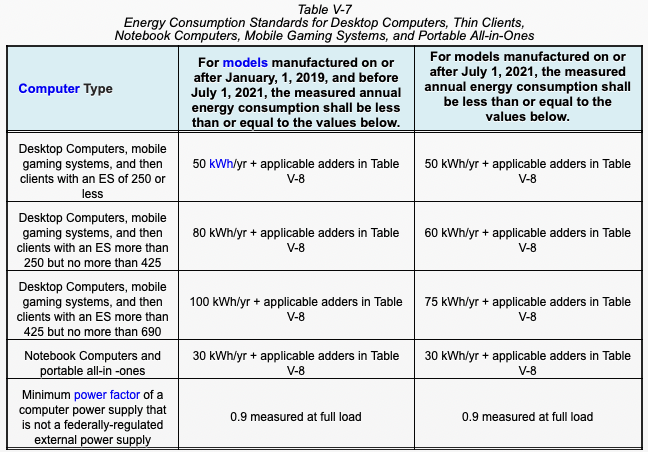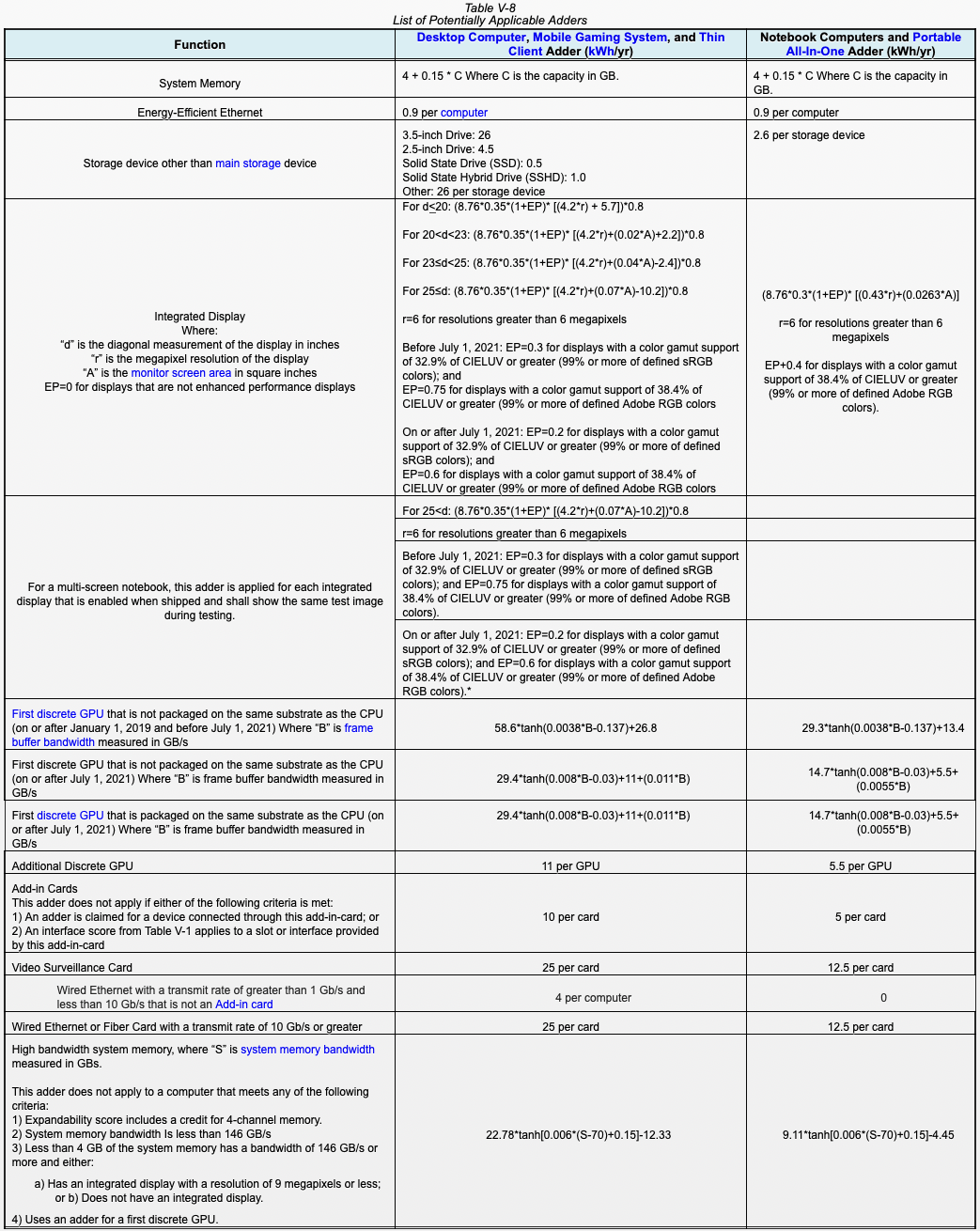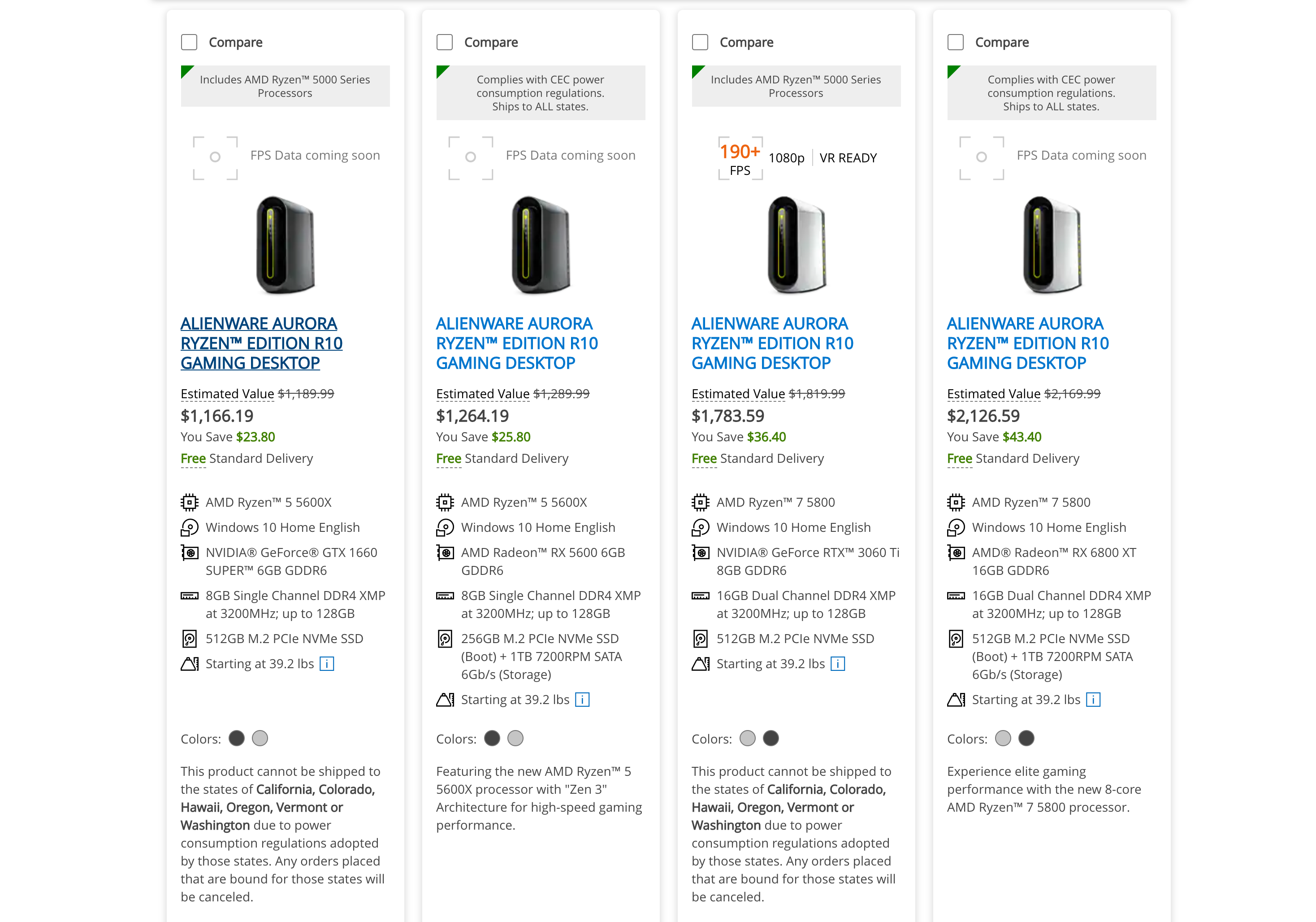Alienware's Competitors Say Their Desktops Don't Face Energy Policy Sale Restrictions
Some companies are saying they can ship all of their gaming PCs anywhere.
After Dell started marking certain configurations of the Alienware Aurora Ryzen Edition R10 and Aurora R12 gaming PCs unavailable in several configurations because of legislation regarding energy usage in six states, it seems that few competitors are having similar issues.
Dell's competitors, including Acer, Asus, HP, Lenovo and MSI don't, as of this writing, have similar language on their websites that suggests restricting shipping. And several of them suggested they're not having any problems abiding by the newly implemented energy policy.
Specifically, Dell is reacting to policy in California, first passed in 2016, along with similar laws (several simply matching California's) in Colorado, Hawaii, Oregon, Vermont and Washington state. A "Tier 2" implementation has gone into effect more recently (July 1st, 2021), more tightly regulating how much electricity a computer can use per year, particularly while idle.
"Alienware has always been known for pushing the limits when it comes to innovation, performance, design and premium quality," a prepared statement from Dell reads. "We respect the laws of all cities, states and countries where we do business and always strive to balance power and performance with energy efficiency. While our most powerful gaming systems are available in all 50 states, it is accurate that select configurations of the Alienware Aurora R10 and R12 aren’t shipping to certain states due to the recent California Energy Commission (CEC) Tier 2 regulations that went into effect on July 1, 2021. New models and configurations will meet or exceed these regulations, in line with our long-term focus to address energy and emissions."
On both the Aurora Ryzen Edition R10 and Aurora R12, Dell does have configurable models that can be shipped to any state with tons of simpler components. Dell's spokespeople didn't respond to questions asking it to detail the differences between those that meet regulatory requirements and those that don't.
Acer and Lenovo, however, have no issues. Acer told Tom's Hardware that "Acer desktops shipped after July 1, 2021 are fully compliant with the new power consumption regulations."
Lenovo's statement is that "We don’t face any restrictions for where we can ship and sell our Legion desktop products. We are compliant with our Legion desktops that will be on the market and ones to come to the market moving forward."
The lack of language regarding the California Energy Commission policy and its ilk doesn't mean other vendors aren't considering their options. Clifford Chun, a systems product management director for MSI, said that MSI had desktops in the channel built before July 1st. Those can continue to be sold, in other states, and he said they shipped plenty to those states early to ensure it has enough ready until August, when it will have systems with CEC improved motherboards.
While MSI's laptops are ready to go, the component shortage pushed its new motherboards back until August. Chun told Tom's Hardware that a single-rail, 12-volt motherboard can help a manufacturer clear a 690 "point" scale easily.
"Just the motherboard itself can resolve 80% of the 690-point system," MSI's Chun said. Obviously the power supply and all this other minor stuff will contribute the rest of the points.” He also pointed out that BIOS tweaks adjusting standby power are also a big part.
The "points" appear to be a reference to two tables in the CEC guidelines, tables V-7 and V-8. The former provides for how much power a computer is allowed to consume, while the second provides more detailed numbers based on components, including how much RAM, storage, discrete GPUs, wired Ethernet and more.


It's possible that MSI's issue - motherboards - could be similar for Dell and Alienware, which use custom boards in the Dell G series and Alienware Aurora gaming PCs. Internally, MSI calls some motherboards for systems integrators “CEC-ready.” Others, like AsRock, list these power adjustments on their products' web pages. These matter far more of pre-builts than for builders, who can buy parts separately and aren't subject to these rules.
Spokespeople for HP and Asus all said they would look into the matter, but did not answer by press time. But based on the answers we do have, it seems that most major pre-built vendors will be over this hurdle soon.
"These regulations were developed in 2016 to address energy use when computers are idle, wasting energy and millions of dollars," CEC executive director Drew Bohan said in a statement to Tom's Hardware. "They were designed with input and involvement from industry, including Dell, to be flexible. The Energy Commission is confident consumer choice remains strong with modifications and options available on the market today. As with all regulations, the state invites manufacturers and retailers to continue to partner with us to create rules that meet customer needs while saving energy."
Get Tom's Hardware's best news and in-depth reviews, straight to your inbox.
While much is being made about the regulations across several states in regards to gaming PCs, there are also rules about air conditioners, lamps, plumbing fixtures, washers and dryers, landscape irrigation equipment and more that must meet new energy efficiency standards in these states. Game consoles, tablets, and, of course, DIY PC's don't fall under these regulations.
Updated July 29, 4:42 p.m. ET with comment from California Energy Commission executive director Drew Bohan.

Andrew E. Freedman is a senior editor at Tom's Hardware focusing on laptops, desktops and gaming. He also keeps up with the latest news. A lover of all things gaming and tech, his previous work has shown up in Tom's Guide, Laptop Mag, Kotaku, PCMag and Complex, among others. Follow him on Threads @FreedmanAE and BlueSky @andrewfreedman.net. You can send him tips on Signal: andrewfreedman.01
-
Heat_Fan89 "Alienware has always been known for pushing the limits when it comes to innovation, performance, design and premium quality,"Reply
As a recent Alienware Aurora owner, that gave me a good laugh. Their laptops are innovative, their desktops are literally a joke on the unsuspecting person who buys one. -
PiranhaTech GamersNexus did a tear-down on Alienware. It was a disappointment. I would be okay with the hack job they did with the cooler for a budget PC, but not an $1800 oneReply
8ulhFi5N2hcView: https://www.youtube.com/watch?v=8ulhFi5N2hc -
Alvar "Miles" Udell I'm willing to bet the problem stems from a not-even-80-plus-certified PSU...Reply -
Bazzy 505 ReplyHeat_Fan89 said:"Alienware has always been known for pushing the limits when it comes to innovation, performance, design and premium quality,"
As a recent Alienware Aurora owner, that gave me a good laugh. Their laptops are innovative, their desktops are literally a joke on the unsuspecting person who buys one.
Dell has been pushing limits allright, but it ain't inovation. It's more along the lines of how far can we push our customers before we get slapped by class action lawsuit :ROFLMAO: -
Heat_Fan89 All anyone has to do is watch the GamersNexus review to see what Dell is pulling over on their customers. It really is that bad. Now, that said I got a better deal than GamersNexus but I still feel I got ripped off but nowhere as bad as them.Reply -
Bazzy 505 ReplyHeat_Fan89 said:All anyone has to do is watch the GamersNexus review to see what Dell is pulling over on their customers. It really is that bad. Now, that said I got a better deal than GamersNexus but I still feel I got ripped off but nowhere as bad as them.
There's one thing GamersNexus got totally wrong in their review. The icon on the box with water droplet isn't meant to suggest it's a water cooled AIO rig. It's meant to say you'll cry if you dare to remove the side panel :LOL:
